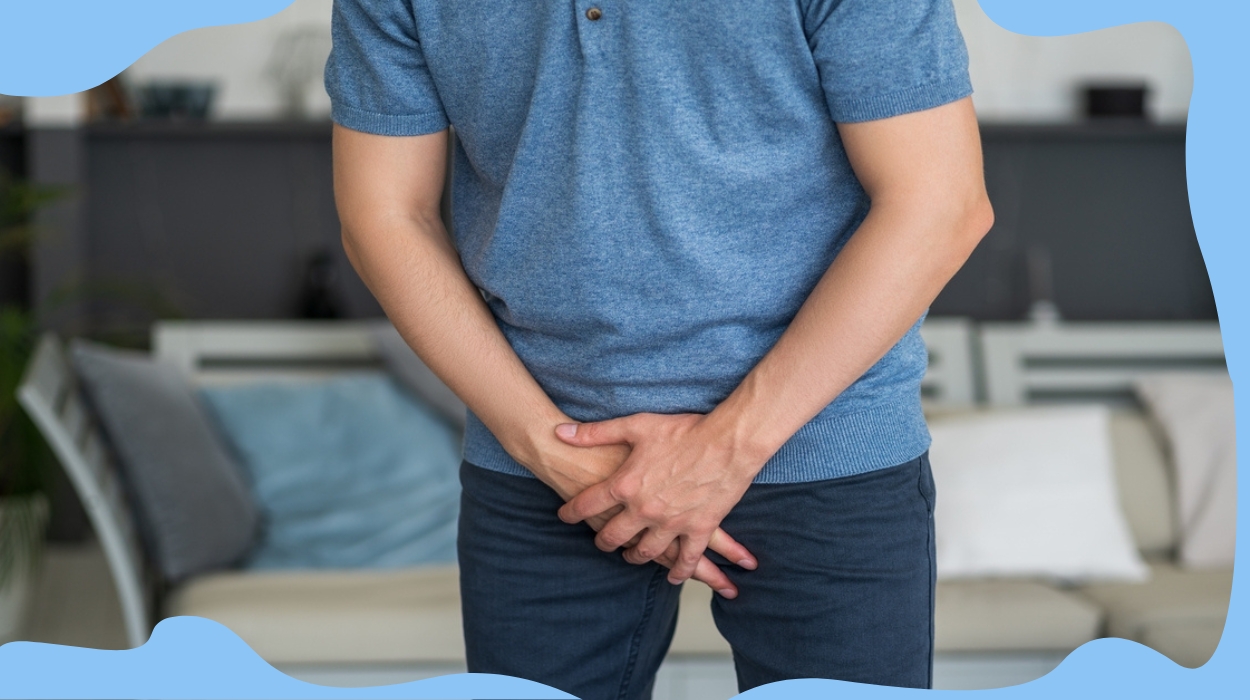 Expert's opinion
Expert's opinion
Expert's opinion
The article is a subjective view on this topic written by writers specializing in medical writing.
It may reflect on a personal journey surrounding struggles with an illness or medical condition, involve product comparisons, diet considerations, or other health-related opinions.
Although the view is entirely that of the writer, it is based on academic experiences and scientific research they have conducted; it is fact-checked by a team of degreed medical experts, and validated by sources attached to the article.
The numbers in parenthesis (1,2,3) will take you to clickable links to related scientific papers.
Kidney Stone Testicle Pain 2024: 4 Causes & Pain Relief Tips

Kidney stones (also referred to as renal calculi or nephrolithiasis) can be extremely painful. Unfortunately, kidney stones have become more common in recent decades. In the United States, the overall prevalence has been estimated to be as high as 10.9% of men and 9.5% of women[1] aged 20 years and older.
Some small kidney stones can be passed independently, but the amount of time kidney stone pain lasts depends on various factors. When managing this pain, it is beneficial to know how these stones form, what causes the pain, what it may feel like, and when to see a doctor for help. Testicular pain can be particularly distressing, and we will discuss what to do about it!
Kidney Stone Testicle Pain
- What it is: Pain starting in your back, radiating down to your testicle.
- Why it happens: When associated with a kidney stone, an obstruction of the urinary tract causes testicular pain.
- How to relieve it: Ultimately, passing or removing the stone will provide relief, but there are methods to help in the meantime.
Causes Of Testicular Pain
Severe Pain From Kidney Stones
Renal colic[2] is the term for pain associated with stone formation causing a blockage in the urinary tract. The severity of pain can vary depending on the degree of obstruction and its location. The sensation can range from a dull ache to a sharp, piercing pain radiating down into the testicle area and may be associated with nausea or vomiting.
Flank pain (lower back, close to your side) radiating to your testicles is most often caused by stretching of the renal pelvis or proximal ureters due to obstruction. The renal pelvis is where urine formed in the kidneys is collected. Proximal ureters are the tubes that carry the urine from the renal pelvis to your bladder. Stretching in these areas triggers nerves that cause referred pain, felt in your flank and extending to your testicles.
Idiopathic Testicular Pain
The term idiopathic means “unknown origin.” There are times when testicles hurt and it is ultimately not associated with a medical condition. Seeking medical attention, especially for chronic testicular pain, can help you identify whether or not the pain is caused by an underlying condition.
Testicular Torsion
A sudden onset of severe pain in one testicle (and a testicle that may appear to be “high-riding”) may indicate testicular torsion[3]. This is a medical emergency because blood flow to the testicle can be occluded, potentially resulting in the loss of the testicle. The best way to achieve a favorable outcome is to seek medical attention as soon as possible (with intervention ideally occurring in less than six hours).
Testicular Cancer
A disease more common in young men, cancer is a potential cause of testicular pain. Annual exams[4] as a part of a routine physical are recommended, along with more frequent self-exams (up to once monthly) checking for a pea-sized lump. Early detection is helpful for treatment, and this type of cancer is often highly treatable.
Other causes of testicular pain include sexually transmitted diseases, hernias, etc. Your doctor can help you determine a potential cause.
Kidney Stone Testicle Pain Relief Tips
Pain associated with kidney stones can be alleviated upon passing the stone, and there are some home remedies for trying to pass kidney stones more quickly. Very small kidney stones may pass on their own, but others may require the help of a doctor.
Suppose you are not experiencing nausea and are able to take a tablet. In that case, over-the-counter pain medications such as ibuprofen (Advil) or acetaminophen (Tylenol) can help make the process of passing kidney stones less painful.
Your doctor may also prescribe a medication such as an alpha blocker to help relax the ureters and make the stone easier to pass. Stronger pain medications are also available by prescription, providing additional support when needed.
What Are Kidney Stones?
A kidney stone is a grouping of material that crystallizes and forms a solid “stone” in your urine. These form in the kidneys, but can cause painful obstructions of urine flow anywhere along the urinary tract. The amount of time it takes to pass a kidney stone depends on the size. The most common stones are made up of[5]:
- Calcium Oxalate (61%)
- Calcium Phosphate (15%)
- Uric Acid (12%)
There are several other potential types of kidney stones, including struvite stones and cystine stones. Determining which one is the cause (and developing a more targeted plan for prevention) requires the help of a doctor providing imaging, blood, and urine tests. Kidney stones are more likely to form in acidic urine, so some general strategies attempt to regulate urine pH levels.
There are some available approaches for prevention, like mixing apple cider vinegar or citrus juice[6] in beverages. These have mixed results. Apple cider vinegar gummies such as Goli gummies attempt to enhance the effect. Drinking enough fluids (typically at least 2.5 liters) to produce at least two liters of urine is the most reliable way to regulate the acidity of your urine.[7]
A goal of eight glasses of water daily does not account for variability among individuals. Targeting 3.7 liters for men and 2.7 liters for women[8] (higher requirements during pregnancy) is a good starting point, but additional adjustments can be helpful.
If you’re sweating, drink more water. If you eat something salty, drink more water! This helps prevent your urine from becoming more acidic. Watching the color can be helpful – dark yellow urine indicates you may not be drinking enough fluids.
Testicle Pain With Kidney Stones: When To See A Doctor

The intensity of pain itself is not a reliable predictor of kidney stone size or your potential ability to clear the stone on your own. If your pain is not controlled by taking over-the-counter pain medications, or you are feeling sick to your stomach or vomiting, it’s time to schedule an appointment with your doctor.
You should seek more immediate medical treatment if:
- You are experiencing fever or chills.
- You have cloudy urine.
- You have bad-smelling urine.
- There is blood in your urine.
Some of these are signs of a urinary tract infection or a kidney infection. Leaving these symptoms untreated can lead to more serious diseases,[9] including sepsis and muscle relaxants. Talk to your doctor before taking magnesium supplements if you take any medications.
Conclusion
Kidney stones are often very painful and can involve pain in the testicles. Your doctor can help you pinpoint the cause of your pain and the best treatment options. They can also help you formulate a prevention plan that targets a specific cause once identified, such as calcium stones. Emergency care is recommended if you are showing signs of infection!
Frequently Asked Questions
Calcium oxalate stones are the most common. If you’ve had a calcium oxalate stone, you may consider targeting 1200mg of calcium per day in your diet instead of using a supplement. Calcium from dietary sources is better at binding oxalate and preventing new stone formation.
Yes, provided you didn’t have a reason not to use NSAIDs (ibuprofen, naproxen) prior to your kidney stone. NSAIDs are not recommended for patients who are taking a blood thinner, have chronic kidney disease, have had a stomach ulcer, and several other conditions. If you are unsure whether NSAIDs are safe for you, ask your doctor or pharmacist.
There are a number of environmental factors, and you can make lifestyle changes to make kidney stones less likely. That said, there are heritable traits[10] that predict kidney stone likelihood. The good news is that a better understanding of these traits provides an opportunity for more tailored care in the future for individuals identified as having a higher risk of developing kidney stones.
There have been several suggestions for why this may occur, such as differences in salt and protein content in the diet, potential hormonal differences, and other factors. Ultimately, a reliable answer to this question hasn’t been determined. The gender gap does appear to be closing[11] in recent years, however.
+ 11 sources
Health Canal avoids using tertiary references. We have strict sourcing guidelines and rely on peer-reviewed studies, academic researches from medical associations and institutions. To ensure the accuracy of articles in Health Canal, you can read more about the editorial process here
- Abufaraj, M., Xu, T., Cao, C., Waldhoer, T., Seitz, C., D’andrea, D., Siyam, A., Tarawneh, R., Fajkovic, H., Schernhammer, E., Yang, L. and Shariat, S.F. (2020). Prevalence and Trends in Kidney Stone Among Adults in the USA: Analyses of National Health and Nutrition Examination Survey 2007–2018 Data. European Urology Focus. doi:https://doi.org/10.1016/j.euf.2020.08.011.
- Patti, L. and Leslie, S.W. (2023). Acute Renal Colic. [online] Nih.gov. Available at: https://www.ncbi.nlm.nih.gov/books/NBK431091/.
- SHARP, V.J., KIERAN, K. and ARLEN, A.M. (2013). Testicular Torsion: Diagnosis, Evaluation, and Management. American Family Physician, [online] 88(12), pp.835–840. Available at: https://www.aafp.org/pubs/afp/issues/2013/1215/p835.html.
- Fadich, A. (2018). USPSTF Testicular Examination Nomination–Self-Examinations and Examinations in a Clinical Setting – Ana Fadich, Salvatore J. Giorgianni, Michael J. Rovito, Gregory A. Pecchia, Jean J. Bonhomme, Wesley B. Adams, Colin L. Stephenson, Felipe E. Mesa-Morales, Justin Scott Sparkes, 2018. [online] American Journal of Men’s Health. Available at: https://journals.sagepub.com/doi/10.1177/1557988318768597.
- Hoffman (2021). Kidney Disease: Kidney Stones. FP essentials, [online] 509. Available at: https://pubmed.ncbi.nlm.nih.gov/34643363/.
- Yazeed Barghouthy and Somani, B.K. (2021). Role of Citrus Fruit Juices in Prevention of Kidney Stone Disease (KSD): A Narrative Review. [online] 13(11), pp.4117–4117. doi:https://doi.org/10.3390/nu13114117.
- Leonardo Ferreira Fontenelle and Thiago Dias Sarti (2019). Kidney Stones: Treatment and Prevention. American Family Physician, [online] 99(8), pp.490–496. Available at: https://www.aafp.org/pubs/afp/issues/2019/0415/p490.html#afp20190415p490-b15.
- Armstrong, L.E. and Johnson, E.C. (2018). Water Intake, Water Balance, and the Elusive Daily Water Requirement. [online] 10(12), pp.1928–1928. doi:https://doi.org/10.3390/nu10121928.
- Mariya Belyayeva and Jeong, J.M. (2022). Acute Pyelonephritis. [online] Nih.gov. Available at: https://www.ncbi.nlm.nih.gov/books/NBK519537/.
- Howles, S. and Thakker, R.V. (2020). Genetics of kidney stone disease. [online] 17(7), pp.407–421. doi:https://doi.org/10.1038/s41585-020-0332-x.
- Gillams, K., Juliebø-Jones, P., Siri Øvereng Juliebø and Somani, B. (2021). Gender Differences in Kidney Stone Disease (KSD): Findings from a Systematic Review. [online] 22(10). doi:https://doi.org/10.1007/s11934-021-01066-6.



